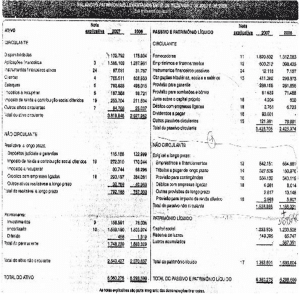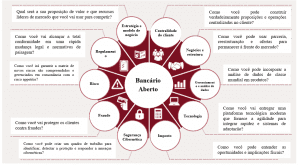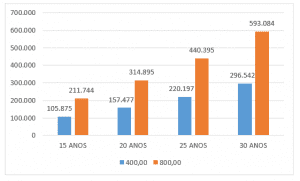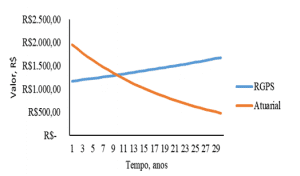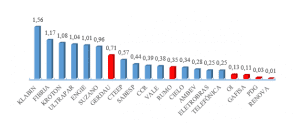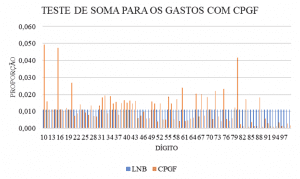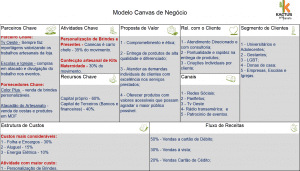ORIGINAL ARTICLE
MARZZONI, David Nogueira Silva [1], OLIVEIRA, Mario Cesar Sousa de [2], BARCELOS, Tiago Soares [3]
MARZZONI, David Nogueira Silva. OLIVEIRA, Mario Cesar Sousa de. BARCELOS, Tiago Soares. Waiver of Bidding for Public Purchases in the State of Pará. Revista Científica Multidisciplinar Núcleo do Conhecimento. Year 06, Ed. 03, Vol. 04, pp. 94-110. March 2021. ISSN: 2448-0959, Access Link: https://www.nucleodoconhecimento.com.br/accounting/public-purchases
ABSTRACT
This article presents an analysis of the direct contracts provided for in Law No. 8,666/1993 and Law No. 13,979/2020, during the Covid-19 pandemic. That said, it aims to investigate how many were the expenses made by the State of Pará in the last 10 years on direct contracts performed, especially through the exemption from bidding. This is a bibliographical research on the subject, which sought to contribute and highlight the understanding of aspects that cover public procurement. In the meantime, it is still characterized as a case study that aimed to identify the amounts spent by the government on purchases, made only by the state of Pará. To carry out the research, the collected data were obtained through the “compraspara.pa.gov.br” shopping transparency portals that have the public procurement processes made by the agencies and the “transparenciacovid19.pa.gov.br” associated with emergency purchases and contracts related to Covid–19, and later, a content analysis of the proposed theme was performed. In short, according to the results, it was possible to verify that there was an anticipation of the State of Pará in spending 202 million on purchases early in the pandemic when there was little scientific data to support political decisions, which by the end of the first half of 2020 had already reached 419 million. These expenses did not prevent the state of Pará from presenting the highest rate of reported cases and confirmed deaths among the federative units, surpassing even the State of Minas Gerais, which, if compared, has twice as many inhabitants.
Keywords: COVID-19, Direct Contracting, No bidding.
1. INTRODUCTION
The year 2020 represents one of the biggest challenges for political leaders due to the emergence of the new coronavirus. The pandemic caused by Sars-Cov-2, so called by the scientific community, proved to be one of the biggest health problems on a global scale. To Zucatto et al. (2020) became one of the main subjects of research centers, several studies began to be launched to understand the global scenario, only in the first quarter of 2020 the journal The Lancet had already published 20 papers, most of which were characterized as basic and applied research.
The virus was first identified at the end of 2019 in Wuhan (China), the main means of contamination include direct transmission through cough, sneezing and perdigotos in addition to transmission by contact with oral, nasal and eye mucosa (BRASIL, 2020). In a short time the Sars-Cov-2 virus spread throughout the world, and soon after the COVID-19 pandemic was decreed by the World Health Organization (WHO).
The profile of the risk or vulnerable group that may develop the most severe condition of the disease and, therefore, are more likely to die due to infection, are the elderly and people with other associated diseases, such as cardiac, diabetic and respiratory problems such as asthma and bronchitis (LIMA, 2020). These groups of people have priority in health care and testing for the virus.
Brazil is one of the countries most impacted by the new coronavirus, reaching 110,000 killed by Covid-19 in five months of pandemic. The lack of public policies to combat the virus has placed the country in second place in the world in number of confirmed cases, second only to the United States (CUT, 2020).
The disease mainly penalizes the periphery of Brazil, the North and Northeast regions are one of the ones that suffer the most from coping with the disease (SILVA, 2020). According to data from the Brazilian Institute of Geography and Statistics (IBGE, 2020), public services are precarious for more than 75% of the population. The health system is insufficient and begins to collapse in some states (FORATO, 2020). This reality demonstrates how unprepared Brazil is to contain a pandemic, and highlighted the weaknesses of public policies adopted many years ago by different governments.
Given the increase in contaminated people and deaths resulting from the pandemic, the value of contracts investigated by the Federal and Civil Police (MP) in the Brazilian states, reaches almost R$ 1.5 billion, due to evidence of fraud in purchases and contracts signed to combat the disease (PEIXOTO, 2020). There are contracts investigated in Rio de Janeiro, Pará, Maranhão Santa Catarina, Ceará, Amapá, Roraima, Acre, Rondônia and others.
This research analyzed the expenditures of the State of Pará to contain the progress of the Covid-19 pandemic. The study was justified because the State is one of the search targets in an operation of the FP (Federal Police) that investigates a fraud scheme in the purchase of respirators in the fight against Covid-19, in the modality of exemption from bidding.
The question that raises the so many doubts is: how are the purchases being made to cope with Covid-19 in the State of Pará and its main forms of contracting?
Therefore, the aim of this study is to analyze the bids and administrative contracts. Identify how much the government of the State of Pará spent in the first half of 2020 with the acquisition of goods or services in contracting through the exemption from bidding.Investigate the last 10 years of purchases made with exemption from bidding by the government. And finally, to determine which public agencies have made the most acquisition in the modality dispensing with bidding.
2. PUBLIC BIDDING
The federal government due to the state of public calamity resulting from the pandemic has enacted a federal law that allows, without the need for bidding, the purchase of insums to combat the disease. The contracting through the exemption from bidding is a debureaucratization applied to special cases provided for by law for the acquisition of goods and services indispensable to the attendance of the emergency situation.
It is worth noting that law 8.666/93 in particular Art. 3, which conceptualizes bidding:
The bidding is intended to ensure compliance with the constitutional principle of isonomy, the selection of the most advantageous proposal for the administration and promotion of sustainable national development and will be processed and judged in strict accordance with the basic principles of legality, impersonality, morality, equality, publicity, administrative probity, binding to the convening instrument, objective judgment and those related to them (BRASIL, 1993).
For Meirelles (2010), bidding is the administrative procedure by which the Public Administration selects the most beneficial proposal for the contract of his interest. This enables equal opportunities for all stakeholders, and acts as a factor of efficiency and ethics in the administrative transactions of the State.
Thus, Lopes (2020) points out that, according to the Federal Constitution, any conclusion of legal business with private third parties made by the public administration should be, in general, carried out through the Bidding, with respect to any sphere of contracting that covers, for example, from the hiring of insums for public hospitals, to the hiring of services for the performance of a work.
The negotiation in the bidding expands the advantages of the public administration in obtaining the most advantageous proposals. Hence the importance of professionals with technical qualification for the execution of bids. Marzzoni et al. (2020) public managers should allocate spending in such a way that they meet the needs of the population. And to make public purchases according to Gasparini (2010),
With regard to public procurement, Alves, Trilha and Nunes, (2018, p.74) assert that the bidding procedure should be adopted as a priority by the public administration in order to meet their demands for goods and services by selecting a more advantageous proposal, with a view to “promoting sustainable national development, with compliance with the provisions of public law , unlike the private person who makes their contracts in a discretionary manner.”
Due to all the bureaucracy in the bidding process resulting from the legal regulation Lopes (2020) considers that in certain contexts, the possibility of supporting such a wait for the object of the contract ing to be executed is minimal, because compliance with all the procedures observed makes the bidding process time consuming. Marzzoni and Souza (2020) already state that there is great difficulty of professionals in knowing the technical part as the purpose and importance of the authorization protocol for use, some nomenclatures in the process.
During the execution of the bidding process, certain events may occur capable of achieving the economic balance established between the public and private administration. Such misfortunes are treated by Law No. 8,666/93 as the legitimizing cause of bilateral contractual changes. The situation of calamity in health caused by the pandemic and that made some changes, the federal government enacted a law that allows, without the need for bidding, the purchase of insums to combat covid-19.
For Marçal Justen Filho (2012, p. 334) the exemption from bidding is applied when “although viable competition between individuals, the bidding seems objectively incompatible with the values of the administrative activity”. The law exempts bidding so that there is no sacrifice of collective interests, the exemption from bidding is provided for in art. 24 of Law 8666/93. The current circumstance, experienced by practically the whole world, perfectly matches this hypothesis, due to the pandemic caused by the dissemination of Covid-19, public agents find themselves in situations that require a slight performance in the fight against the disease, making use of the legal device of exemption from bidding.
3. METHODOLOGY
This research is characterized as a case study. According to Cervo and Bervian (2007, p 62), “a case study is research on a particular individual, family, group or community that is representative of their universe […]”. Considering that “most federative units follow with justice investigation processes around the exemption of bidding during the pandemic” (LOPES, 2020), this research analyzed only the State of Pará.
This article was based on a bibliographical research on the subject and on a content analysis. “Content analysis methods include the use of relatively precise techniques such as calculations, graphs, relative frequency tables or co-occurrences of the terms used, preventing the researcher from interpreting the data according to their own values” (QUIVY, 2008).
Data collection was performed through the state government’s purchasing transparency portals, as well as consultations in articles, newspapers and administrative contracts. The techniques of data collection used were direct observation in bidding contracts and consultation of the government bidding system, available on two institutional sites the “compraspara.pa.gov.br” that is responsible for providing all information to citizens about the public procurement processes made by the organs and entities of the State Executive Branch, and the site “transparenciacovid19.pa.gov.br” that presents the relevant legislation snaantis to combat the emergency in public health, resulting from the new Coronavirus / Covid–19, in addition to dealing with guidelines related to the processes of emergency procurement and hiring related to Covid–19 in the State.
The years analyzed in the research were from 2010 to 2020, and only the first half of each year was observed (from January to June). Once the data were obtained, the next step was the analysis and interpretation of the data, the content was transferred to a spreadsheet editor, the Microsoft Excel application, where graphs and tables were elaborated to represent the data in the last ten years.
All the researches presented were useful for the interpretation of the theme exposed, and a necessary amount was raised to reach the conclusions, causing the analysis with the expenses in the modality of bidding exemption to be interpreted correctly.
4. RESULTS AND DISCUSSION
Data analysis is arranged in two parts: the first deals with the analyses regarding how much was spent on the acquisition of goods or services in contracting through the exemption from bidding in 2020, with the justification of the Covid-19 pandemic. Subsequently, the expenses with exemption from bidding in the last 10 years are analyzed, considering only the first half of each year. Table 01 was prepared in order to identify the institutions that opted for exemption from bidding in the State, and the total amounts spent by them in the first half of 2020.
Table 1: Amounts spent per institution through the exemption from bidding, 1st semester 2020.
| Public Institution (Government of the State of Pará) | Amounts R$ |
| Santa Casa de Misericórdia Foundation of Pará – FSCMP | 114.580,00 |
| Military Police of Pará – PMPA | 204.000,00 |
| Foundation Center for Hemotherapy and Hematology of Pará – HEMOPA | 71.696,80 |
| Secretary of State for Public Health – SESPA | 167.532.768,34 |
| State University of Pará – UEPA | 77.011,05 |
| Secretary of State for Education – SEDUC | 193.341.267,24 |
| Central State Laboratory – LACEN | 215.627,96 |
| Public Security Investment Fund – FISP | 603.548,00 |
| Technical Assistance and Rural Extension Company of the State of Pará – EMATER | 500,00 |
| 10th Regional Health Center – 10º CRS/SESPA | 35.245,00 |
| Secretary of State for Social Assistance, Labor, Employment and Income – SEASTER | 957.000,00 |
| State Public Foundation Hospital de Clinicas Gaspar Vianna – FHCGV | 35.120,52 |
| Civil Police of the State of Pará – PC | 248.000,00 |
| Secretary of State for Urban Development and Public Works – SEDOP | 52.076.935,55 |
| Renato Chaves Center for Scientific Expertise – CPCRC | 207.125,00 |
| Amazon Foundation for Research and Study And Research – FAPESPA | 32.996,00 |
| Social Assistance Fund of the Military Police of Pará – FASPM | 37.970,59 |
| Pará Peace Foundation – FP | 126.000,00 |
| Port and Waterway Company of the State of Pará – CPH | 5.940,00 |
| Socio-educational Care Foundation of Pará – FASEPA | 34.2000,00 |
Source: Survey data (2020).
Based on Table 01, it is noticeable that the Departments SESPA, SEDUC and SEDOP were the ones that most spent on bidding processes through the exemption from bidding, the three joints spent a total of R$ 412,950,971.13. SEDUC is the one with the highest expenditure of R$ 193,341,267.24, followed by SESPA with R$ 167,532,768.34. In relation to the institutions of the State of Pará that made fewer purchases through exemption from bidding stand out EMATER with only R$ 500.00 and CPH with R$ 5,940.00, the other bodies all exceeded more than 30,000 reais in purchases of goods or services without bidding. In total, there were 20 state government institutions that used the bidding waiver in the first half of 2020, disbursing R$ 416,265,332.05 in direct contracting.
Below Graph 01 presents the total amounts of acquisitions made by the State through the monthly exemption from bidding, from January to June 2020.
Graph 01: Purchases with exemption from bidding in the State, 1st semester of 2020.

The state government used R$ 419,497,386.91 in the first half of 2020, it is observed in Graph 01 that March was the period with the highest spending to the public in direct contracting, R$ 202,655,027.77. In view of this, March was also the month that the World Health Organization declared a pandemic of coronavirus, and the Ministry of Health declared recognition of community transmission of the new coronavirus throughout the national territory, until March 31, 4,683 confirmed cases and 132 deaths from coronavirus in the country (MS, 2020). However, the State of Pará until the same date recorded only 37 confirmed cases and one death (SESPA, PA). Graph 2 adapted from the press consortium shows the number of deaths by the end of March.
Figure 02: Number of deaths (x100) confirmed as of March 31, 2020.
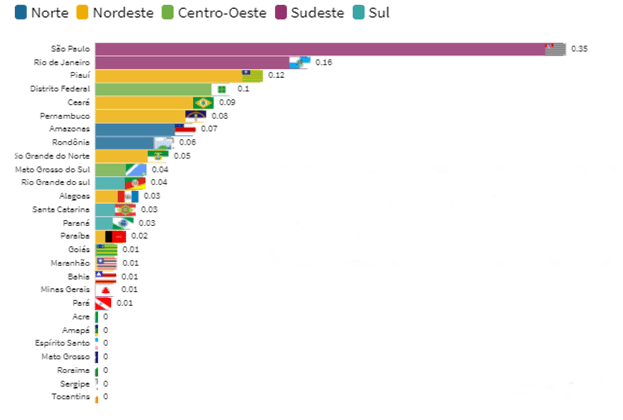
Considering Graph 01 and Graph 02, it can be seen that the month of higher spending of the State of Pará in the first half of 2020 in direct contracting coincides with the beginning of the pandemic, when there was little data to receive public policy decisions with such atypical values for bidding exemption. Although, the serious pandemic situation requires rapid action from the government.
Graph 03 below shows new cases per notification day between the period, April 1 st to July 31. Revealing the month of June in the first half as the period of greatest notification by Covid-19 in Pará.
Graph 03: New cases per day of notification of Covid-19 in Pará
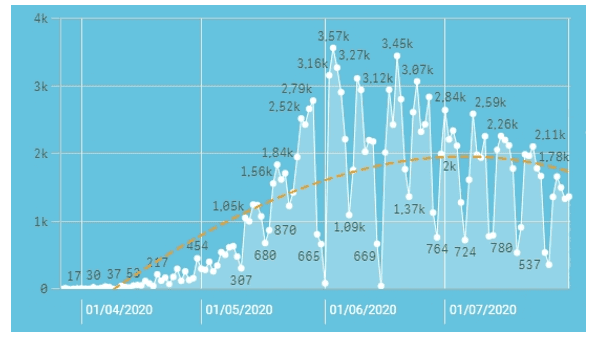
Having said that, it is understood that as the number of cases by Covid-19 (Graph 03) increased the state government was reducing direct purchasing policies with suppliers, since the month of June was the period that Pará less made acquisitions with exemption from bidding, only 30 thousand reais of direct purchases, a difference of more than 200 thousand reais compared to the beginning of the pandemic. For Justem Filho (2012), the realization of the exemption from bidding is objectively contrary to the public interest, although the law exempts the administrator from carrying it out as a result of the state of public calamity.
Below Graph 03 shows the quantity of acquisitions of goods or services acquired by the State of Pará in the last 10 years through the exemption from bidding.
Graph 04: Exemption from bidding in the State of Pará from 2011 to 2020, 1st semester of each year.
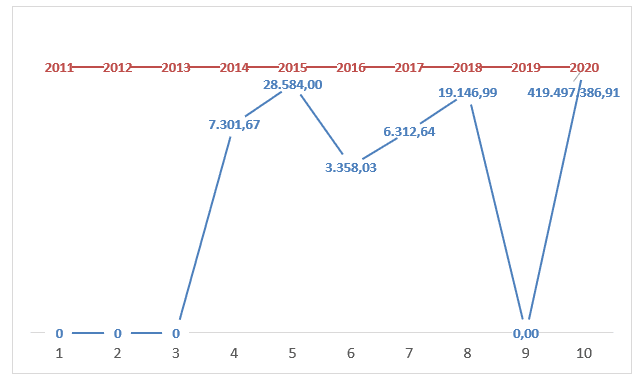
From Graph 04, it is noticed that in the last 10 years the acquisitions of the State Government in direct contracting in the first half of each year were carried out with very modest values, with the exception of 2020 that almost reached the mark of half a billion, considering that the hypotheses are provided for in art. 24 of Law 8.666/93, item IV, which provides for the exemption due to emergency or public calamity. It is also noted in Graph 04 that the years 2011, 2012, 2013 and 2019 do not appear in the state’s system (website) no acquisition through bidding waiver, and that for five consecutive years from 2014 to 2018, the State made direct purchases, through the exemption from bidding.
Table 02 then indicates the institutions that made acquisitions through bidding waivers in the last 10 years in the first half of each year and the corresponding amounts, with the exception of 2020 (shown in Table 01).
Table 2: Amounts spent per institution through the exemption from bidding in the last 10 years.
| YEAR | Public Institution (Government of the State of Pará) | Amounts R$ |
| 2014 | Secretary of State for Environment and Sustainability (SEMAS) | 7.301,67 |
| 2015 | Information and Communication Technology Company of the State of Pará -PRODEPA | 28.584,00 |
| 2016 | Pará State Research Foundation – FAPESPA | 1.533,50 |
| 2016 | Pará State Department of Traffic – DMV | 1.824,53 |
| 2017 | 5th Regional Health Center – 5th CRS/SESPA | 5.050,50 |
| 2017 | Renato Chaves Center for Scientific Expertise – CPCRC | 1.262,14 |
| 2018 | Secretary of State for Communication – SECOM | 2.114,44 |
| 2018 | Barcarena Export Processing Zone Management Company – CAZBAR | 17.002,55 |
Source: Survey data (2020).
It is possible to identify in Table 02 that the largest acquisition through the exemption was made by PRODEPA in 2015, corresponding to R$ 28,584.00 (in contract there is acquisition of electronic surveillance services). It is worth remembering that the Information Technology Company is linked to the data processing department, linked to the Secretariat of Finance and Mechanized Accounting of the State of Pará.
Below Graph 05 is possible to better visualize the distribution of purchases made by the institutions that have made the exemption in recent years.
Figure 05: Acquisitions made by exemption from bidding, from 2011 to 2019

Source: Survey data (2020).
It is observed (Graph 05) that the institutions FAPESPA, SECON, CPCRC, SEMAS, DMV, 5º CRS/SESPA, CAZBAR made acquisitions with exemption from bidding with amounts below the dispensation hypotheses provided for in article 24, item II of law 8.666/93, that is, that may be contracted directly. The parameter of values stipulated in law is represented according to Table 01 below:
Table 1 – Bidding waiver limits by value
| MODE | REACH | LIMIT |
| Art.24, I | ENGINEERING WORKS AND SERVICES (including common ones) | R$ 33.000,00 |
| Art.24, II | SHOPPING AND SERVICES
(not included above) |
R$ 17.600,00 |
Source: Prepared by the authors, based on Law No. 8,666/1993 and Decree No. 9.412/202018.
It is also worth mentioning that Law No. 8,666/93 brings other situations that enable direct contracting in its Art. 24. However, the research was directed to analyze only the purchases through the exemption from bidding, disregarding the unenforceability of bidding that was also a form of acquisition used by the Government of Pará during the pandemic.
The results of the research do not show any direct relationship between the increase in purchases with the exemption from bidding, and the advance of the pandemic in the State of Pará. However, it shows huge spending (419 million) with purchases in the form of bidding waiver at the beginning of the pandemic. This time when the specialists had insufficient scientific knowledge about the new coronavirus, about its high speed of dissemination and the ability to cause deaths in vulnerable populations (ANDERSON et al., 2020). Little was known about how the epidemic would spread and affect low-income communities. Therefore, they did not have as they foresee concrete public strategies to be used to confront The Covid-19. Hence the caution with public resources, Hessel (2020) states that Brazilian states do not have the same fiscal space as other developed countries to spend in combating the effects of the pandemic. That said, it is expected responsibility of the leaders with the public budget, since even with all the expenditure that the State had, Pará was still in fourth place until the end of June with the highest number of cases reported and obtained confirmed by Covid-19 (CONASS, 2020). Standing in front of the State of Santa Minas Gerais, which occupied the 18th place of contamination and death and has more than twice the inhabitants of the State of Pará.
5. CONCLUSIONS
This research aimed to present how much the State of Pará has spent in the last ten years using the exemption from bidding, considering the application of current legislation, since direct contracting does not mean violating the law or hiring in any way. The study highlighted the most relevant results, such as the first half of 2020, in which Pará used 419 million in direct contracting due to the pandemic.
In view, that the exemption is the exception and the rule is to bid, the State of Pará, in the month (March) in which the Pandemic Covid-19 was decreed by the WHO, made 202 million in exemption from bidding, without even in this period have scientific data on how to control the pandemic. The article brought a reflection on the use of law 8.666/93 and its Art. 24 that address the legal rite of direct contracting considering only exemption from bidding.
The results indicate 20 institutions that made purchases in the first half of 2020 through bidding exemption, and three of them, SESPA, SEDUC and SEDOP spent a total of 412 million. They draw attention that even with these measures of the State Government in emergency contracts, this did not prevent the State from ranking among the Federative Units with the highest rate of notification and death, surpassing even Minas Gerais, which has twice the population in relation to the State of Pará.
Certainly, this study does not exhaust the whole subject, because it is believed that, to identify the impact of a lack of planning in bidding, if necessary that the control and punishment bodies (courts of accounts, controllership, Federal Police [FP] and Ministry of Justice [MJ]) promote constant inspections, since these institutions have instruments that ensure the recognition of acts of corruption. Thus, it is suggested that future research analyze the amounts spent on exemption from bidding including the unenforceability to have a global amount in direct contraction during the pandemic in Pará, or investigate the exemption bidding in other States.
REFERENCES
ASSOCIAÇÃO BRASILEIRA DE NORMAS TÉCNICAS. NBR 6022: informação e documentação: artigo em publicação periódica científica impressa: apresentação. Rio de Janeiro, 2003a.
ALVES, G. K. ; TRILHA, C. C. S. ; NUNES, R. S. Avaliação dos processos de compras com dispensa de licitação: um estudo em uma universidade federal. ISSN 2237-4558 / Navus / Florianópolis / SC / v.8 / n.2 / p. 73-86 / abr./jun. 2018.
ANDERSON RM, HEESTERBEEK H, KLINKENBERG D, HOLLINGSWORTH TD. How will country-based mitigation measures influence the course of the COVID-19 epidemic? Lancet 2020; 395(10228): 931-4. http://doi.org/10.1016/S0140-6736(20)30567-5.
BRASIL. Ministério da Saúde. Saúde anuncia orientações para evitar a disseminação do coronavírus. Disponível em: <https://www.saude.gov.br/noticias/agencia-saude/46540-saude-anuncia-orientacoes-para-evitar-a-disseminacao-do-coronavirus>. Acesso em: 25 ago. 2020.
______. Constituição (1988). Constituição da República Federativa do Brasil. Brasília, DF: Senado Federal, 1988.
______. Lei 8.666/1993, de 21 de junho de 1993. Regulamenta o art. 37, inciso XXI, da Constituição Federal, institui normas para licitações e contratos da Administração Pública e dá outras providências. Brasília, 21 jun. 1993. Disponível em: <http://www.planalto.gov.br/ccivil_03/Leis/L8666cons.htm>. Acesso em: 19 ago. 2020.
FORATO, Fidel. Quatro estados superam marca de 100 mil casos da COVID-19; país tem 1,36 milhão. Rev. Saúde Uni. 2020; 36(8). Disponível em: <https://canaltech.com.br/saude/quatro-estados-superam-marca-de-100-mil-casos-da-covid-19-pais-tem-136-milhao-167241/>. Acesso em: 22 ago. 2020.
GASPARINI, D. Direito Administrativo. 15. ed. São Paulo: Saraiva, 2010.
INSTITUTO BRASILEIRO DE GEOGRAFIA E ESTATÍSTICA (IBGE). Disponível em < https://www.ibge.gov.br/apps/populacao/projecao/>. Acesso em 22 de maio. 2020
JUSTEN FILHO, Marçal. Comentários à lei de licitações e contratos administrativos. 12. ed. São Paulo: Dialética, 2008. p. 580.
LIMA, Nísia; BUSS, Paulo; SOUSA, Rômulo. A pandemia de COVID-19: uma crise sanitária e humanitária. Cad. Saúde Pública 2020; 36(7). Doi: 10.1590/0102-311X00177020.
MARZZONI, D. N. S. et al. Contabilidade Pública Municipal: Análise do imposto sobre a propriedade predial e territorial urbana. Braz. J. of Develop.,Curitiba, v. 6, n.6,p.36502-36517jun.2020. ISSN 2525-8761. DOI: 10.34117/bjdv6n6-260.
MARZZONI, D. N. S.; SOUZA, E. J. Public digital bookkeeping system: Launch of the NF-e. Research, Society and Development, [S. l.], v. 9, n. 7, p. e837974723, 2020. DOI: 10.33448/rsd-v9i7.4723.
MEIRELLES, Hely Lopes. Direito Administrativo Brasileiro. Ed. São Paulo: Malheiros, 2010.
PEIXOTO, Guilherme. Corrupção ataca R$ 1,48 bilhão destinados ao combate à COVID-19. Revista Estado de Minas Política. Disponível em: < https://www.em.com.br/app/noticia/politica/2020/06/11/interna_politica,1155732/corrupcao-ataca-r-1-48-bilhao-destinados-ao-combate-a-covid-19.shtml>. Acesso em: 23 ago. 2020.
REDAÇÃO CUT. Brasil é o 3º país com mais registros de Covid-19 em 24 horas, mas isolamento cai. Disponível em: < https://www.cut.org.br/noticias/brasil-e-o-3-pais-com-mais-registros-de-covid-19-em-24-horas-mas-isolamento-cai-0227> Acesso em: 26 ago. 2020.
ZUCATTO, L. C.; FREITAS, R. U. C. de .; MARZZONI, D. N. S. . Basic research and applied research: an analysis from scientific production on COVID-19. Research, Society and Development, [S. l.], v. 9, n. 11, p. e63791110179, 2020. DOI: 10.33448/rsd-v9i11.10179. Disponível em: https://rsdjournal.org/index.php/rsd/article/view/10179. Acesso em: 22 dec. 2020.
[1] Master’s degree in Public Administration. Specialist in Public and Tax Management. Graduated in Accounting. Graduated in Business Administration.
[2] Advisor. PhD in Society, Technology and Public Policies.
[3] PhD in Geography; Professional Master’s degree in Socioeconomic and Environmental Sustainability; Degree in Economic Sciences
Submitted: December, 2020
Approved: March, 2021

